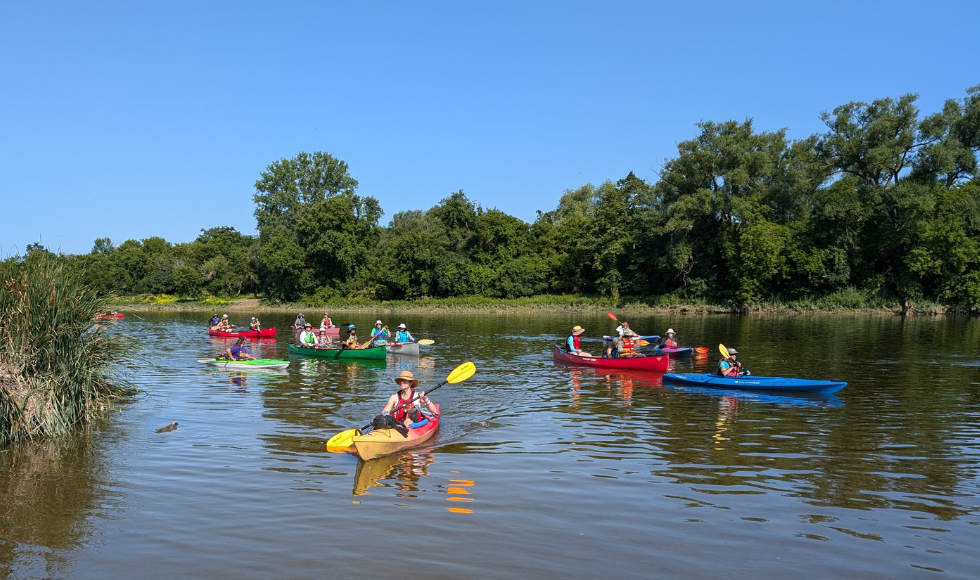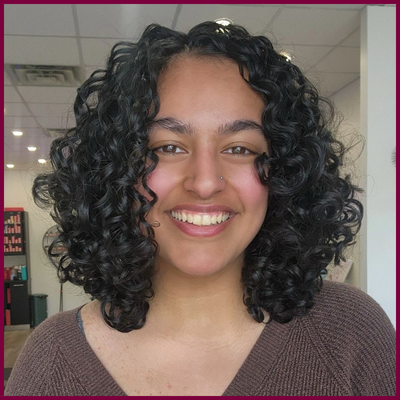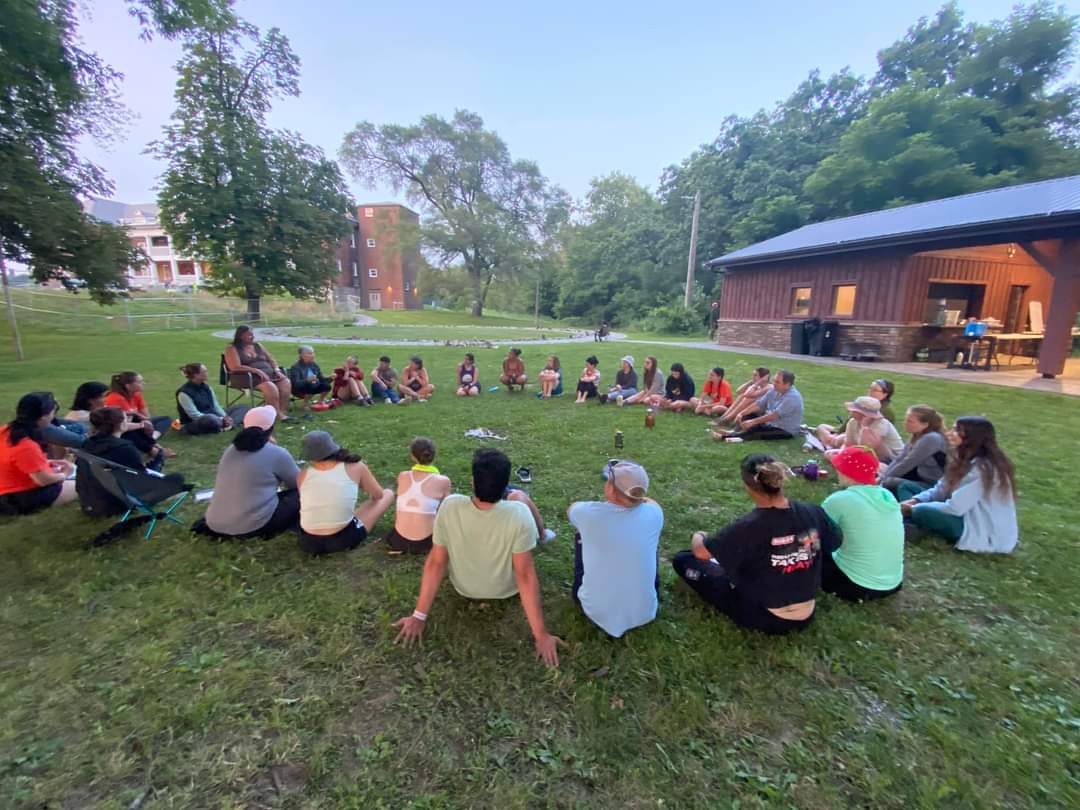Two Row Paddle was ‘a life-changing experience’ for fourth-year student

Participants including McMaster students embarked on a 10-day paddle down the Grand River as part of the Two Row Paddle
This summer, for the first time, McMaster students joined the Two Row Paddle on the Grand River.
As part of INDIGST 4TR3/SOCWK 4TR3, a credit-bearing Intersession course, students from the Indigenous Studies and Social Work departments were part of a cohort of 75 people who paddled in canoes or kayaks over 100 kilometres down the Grand River, learning about Indigenous histories and communities along the way.
The Two Row Paddle has taken groups down the Grand River every summer for nine years. It incorporates the principles of the Two Row Wampum treaty, the oldest treaty still in existence between the Haudenosaunee and non-Indigenous peoples in North America.
Here, social work student Rifa Khoja shares her experiences of the journey.

Hi! My name is Rifa Khoja (she/her) and I’m in my fourth and final year of the Honours Bachelors of Social Work program at McMaster University.
My family and I are Pakistani immigrants and a part of my journey in social work has been exploring this part of my identity, as well as how it relates to the role I play in fighting the ongoing colonization of Indigenous peoples on Turtle Island.
This journey, and the big questions that come out of it, are some of the reasons why I took this course.
Along with wanting to explore my identity, I went into the Two Row hoping for a bit of a mental reset. The monotonous nature of work, school, and life in general were starting to affect my ability to see the bigger picture and I caught myself feeling quite lost.
If you know me personally, you know that a 10-day canoeing trip is about as out of character as it gets for me. So, I figured this would be a great way to reset my brain while also getting a wild life experience under my belt.
Throughout this experience I learned the importance of connecting to your own identity and culture. The amazing guest speakers and profoundly honest conversations I had with folks on the trip showed me that some of the hesitation I feel around my role in supporting/fighting against colonization stems from a lack of understanding about my own identity.

By far my greatest learning and my most significant highlight is the amazing connections I made on this trip: Amazing people on completely different journeys in life, coming together with the understanding of learning from everyone and everything, while also being open to the vulnerability that an experience like this draws out of you whether you are ready for it or not.
One guest speaker that really stood out to me spoke on the importance of language as a tool to resist colonization.
While I have spoken English my whole life, I have always felt more comfortable in my native language. It wasn’t until we moved out of Pakistan that it felt like I was being made to feel shameful about speaking Urdu. Not only from people outside of my culture, but the sheer level of self-shaming that exists within younger generations of my own culture was quite surprising.
The guest speaker, as well as some conversations I had on this topic with my fellow paddlers, allowed me to reflect on how heavily we have internalized the racism and hatred our community has faced.
It also shows how damaging colonization is on a generational scale.
The fact that these ideas have the power to push parents to place greater importance on their children learning how to speak English perfectly, rather than preserving culture and traditions through language, shows how effective colonization can be and has been at eradicating cultures.
This experience also helped me realize the significance of taking the personal initiative to preserve language. I was always aware of the fact that my parents speak four languages each, whereas my sister and I only speak two, but throughout this experience I was able to reflect on how disheartening it is that we lost two languages in just one generation.
There were many people on the Two Row that were taking the initiative to learn their native languages and it was incredibly inspiring for me to see how powerful their efforts are at fighting back against the generational impacts of colonization.
Given that I spend my typical life primarily in offices and my home, I was expecting the paddling part of this experience to be a huge physical and mental challenge.
Mentally, the paddle ended up being the most peaceful part of the journey. It was difficult, no doubt about it, but being able to learn a new skill while also slowly making our way down the river gave me a lot of time to reflect. I’d be lying if I said my sunglasses didn’t also serve the purpose of hiding my tears as the river made me realize exactly how much I needed this time to process.
Even after multiple full days of paddling, my hands didn’t have a single mark or blister to show for it. My feet, however, were an absolute disaster. Believe me, the irony of my feet getting destroyed on a canoeing trip is not lost on me! It wasn’t until halfway through the trip, when my feet became so injured that I had to go to the hospital and was told by the doctor to not go into the water anymore, that I realized exactly how much the water was healing my mind. Thankfully my feet are fully healed now!
I continued the second half of the trip as a part of the ground crew, which meant that we drove from each campsite to the next, helping transport people’s stuff, serve food, and camping along the way.
Although I was disappointed that I couldn’t finish the paddle, I’m glad I got the unique experience of seeing both sides of an experience like this. Plus, everyone was so supportive and caring that I didn’t feel like a burden for a second, which is what I was afraid of when I was at urgent care deciding if I wanted to continue the trip or not.
I’m very happy I stayed for the rest of the trip and the memories and connections I made will certainly last a lifetime!
Going into this experience, I figured that the learning part of this course would be different from any course I have taken before. However, I didn’t expect how individualized the learning experience could be. Everything I was able to learn was unique to my experiences, from reflecting on my culture and how the colonization of my land has affected the way I approach this issue, to my injury showing me how the world around me had forced me to become hyper-independent.
I was quite surprised to find the similarities between some of the Indigenous practices we learned about and the practices of my own culture. It was as if everything, from the similarities in the way we speak about elders to the little bells we wear on our ankles in traditional forms of dancing, was a reminder for me to reflect on my relationship with my culture and everything that colonization has taken away from us.
Despite the fact that there were over 70 people on this trip, the learning experience felt extremely personalized and allowed me to take on the big questions that led me to taking part in this experience.
My advice for future paddlers
- Be a sponge. You will learn something from everyone and everything so long as you are open to it. I never would have thought that a foot infection would have led to me having to challenge an aspect of my personality I have been pushing aside my entire life but that’s just how life works sometimes. Having people pitching my tent for me when I wasn’t physically able to forced me to learn to accept help and learn that you cannot truly be a part of a community unless you are willing to be supported the same way you support others.
- Don’t be scared! Trust me, I am about as much of an indoors person as it gets, and I managed just fine! There are safety paddlers that are amazing and will make sure you don’t drown even if you have never paddled down a river like myself. You will also have more experienced campers who very politely told me I was doing everything wrong. You have a duty towards the community, but you also have to let the community take care of you.
- It will be a life changing experience if you allow it to be! Prepare to learn and welcome any emotion, joyful or painful.


